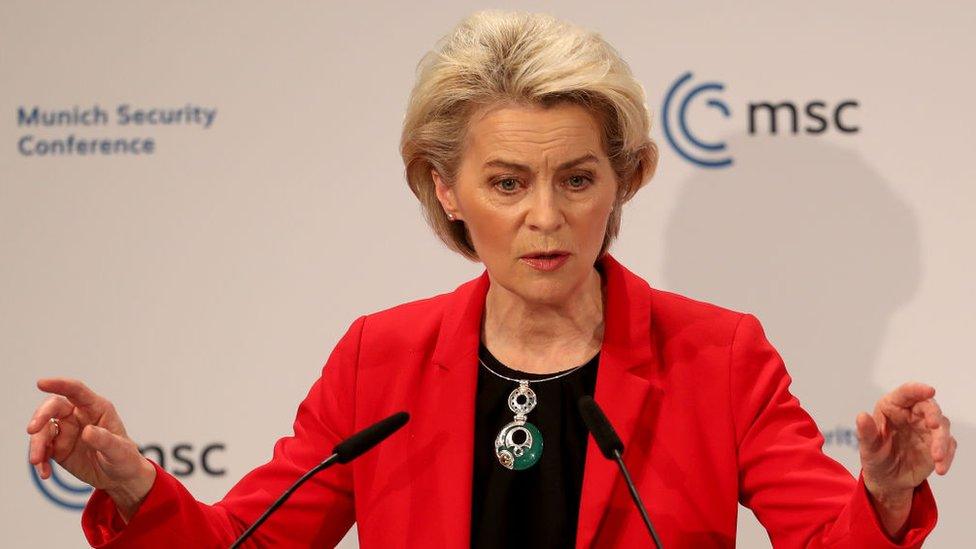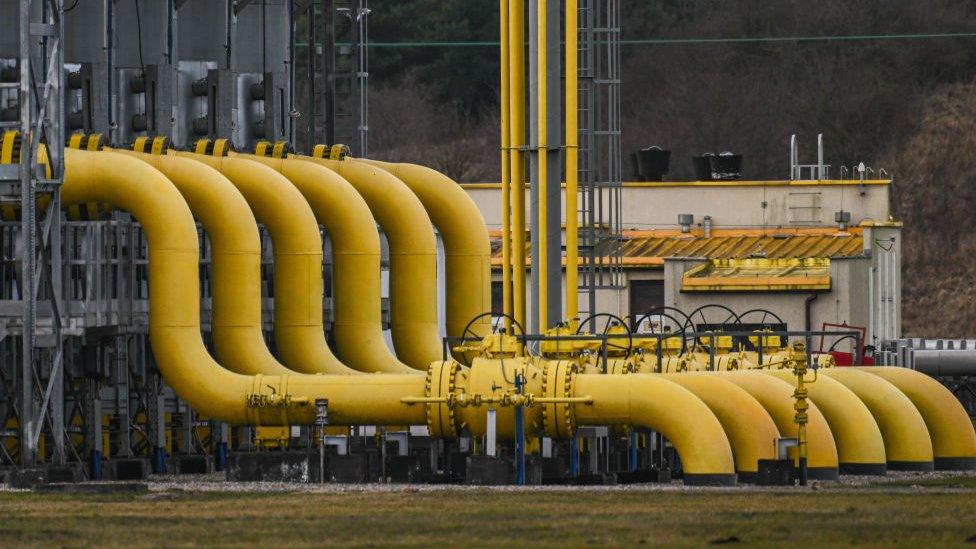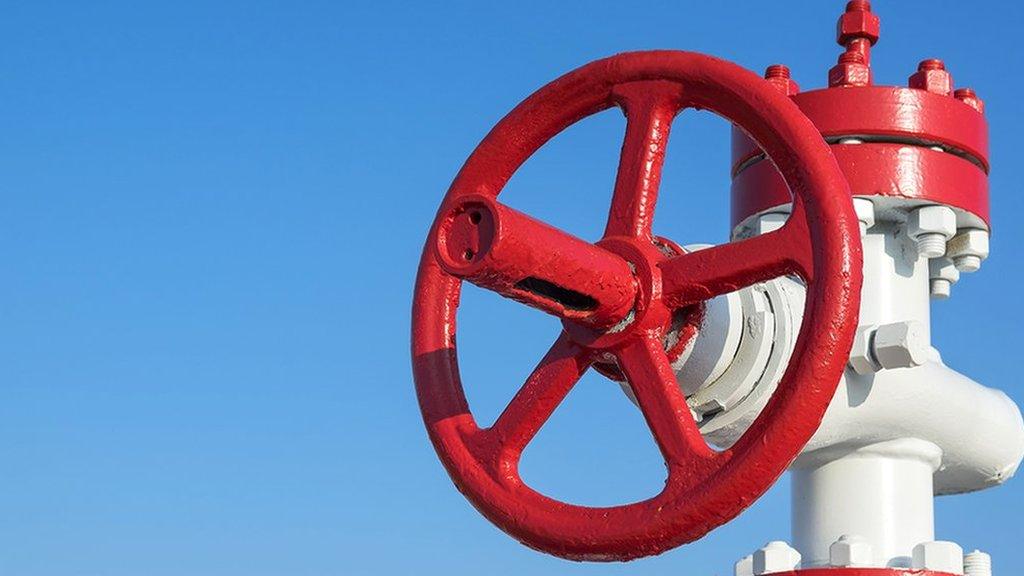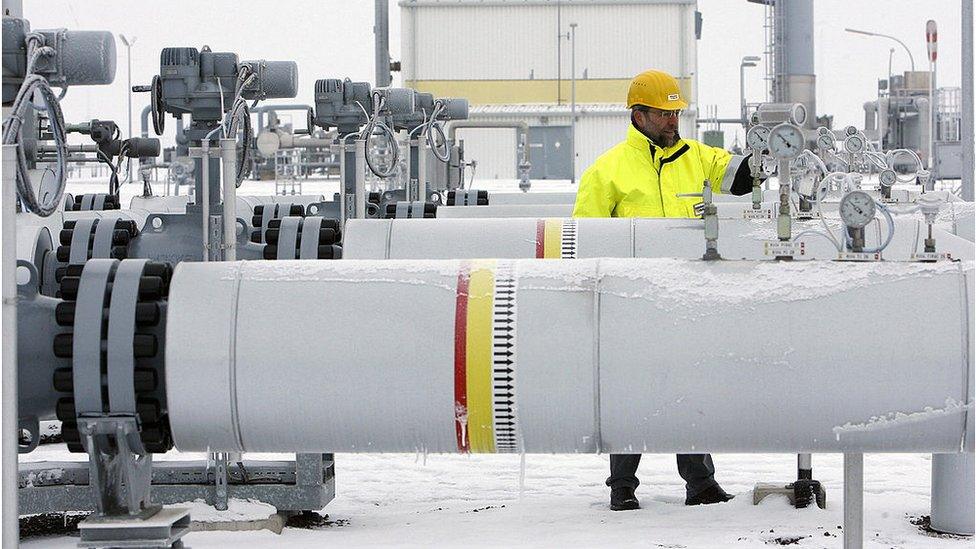Ukraine War: Russia gas supply cuts 'blackmail', says EU
- Published
- comments

Ursula von der Leyen said the EU will support member states impacted by the gas freeze
Russia's decision to cut off gas exports to Poland and Bulgaria is an "instrument of blackmail", the EU says.
European Commission president Ursula von der Leyen said the move showed Russia's "unreliability" as a supplier.
But the Kremlin said Russia had been forced into the action by the "unfriendly steps" of Western nations.
Europe depends on Russia for more than a third of its gas needs and state energy giant Gazprom holds a monopoly on pipeline supplies in Russia.
While many European countries have taken steps to wean themselves of Russian oil imports since it invaded Ukraine, Russia has continued to supply large amount of gas to many European countries.
After Western powers placed financial sanctions on Russia in response to its invasion, Russian President Vladimir Putin announced that "unfriendly" countries would have to pay for gas in Russian currency.
Gazprom said this was why it had suspended supply to Bulgaria and Poland.
Poland said the move was in retaliation for Polish sanctions against Russian individuals and firms. Poland has also been a key transit country for weapons to Ukraine.
Bulgaria has historically had warm relations with Russia, but a new government took office last year which has denounced the invasion.
President Putin meanwhile warned that if Western forces intervene in Ukraine, they will face a "lightning-fast" military response.
In what is seen as a reference to ballistic missiles and nuclear arms, he told lawmakers in Moscow: "We have all the tools no-one can boast of... we will use them if necessary."
But there are signs that Russia's offensive in Ukraine is not going as smoothly as planned, with one official saying Russian forces are having difficulties overcoming a "staunch Ukrainian resistance" in their offensive in the east of the country.
In reaction to Gazprom's statement regarding the suspension of gas supplies to Poland and Bulgaria, Polish state gas company PGNiG confirmed that Gazprom's supplies to the country had been halted and warned that it reserved "the right to seek compensation".
Polish President Andrzej Duda said "appropriate legal steps" will be taken against Gazprom, while his deputy foreign minister, Marcin Przydacz, told the BBC that Russia was seeking to "foster divisions" between Western allies.
Bulgarian Prime Minister Kiril Petkov said the country was reviewing all of its contracts with Gazprom, including for transit of Russian gas to Serbia and Hungary, emphasising that "one-sided blackmail was not acceptable".

Poland imports gas from Gazprom via the Yamal pipeline
Bulgaria, which relies on Gazprom for more than 90% of its gas supply, said overnight it had taken steps to find alternative sources but no restrictions on gas consumption were currently required for Bulgarians.
Ms von der Leyen, speaking in Brussels, said Gazprom's move was "unjustified and unacceptable," but emphasised that the bloc was "prepared for this scenario".
She added that the EU, along with its international partners, will implement an "immediate, united and coordinated" response.
The EU leader also hit out against reports carried by the media outlet Bloomberg, external which alleged 10 European energy companies are preparing to make payments for Gazprom gas in roubles, and that four energy companies have done so already.
She said such moves would be "high risk" for the corporations and would constitute "a breach of our sanctions".
"Our guidance here is very clear," Ms von der Leyen said.
While the EU has been firm that it will not comply with Mr Putin's demands that payments be made in roubles, Hungary has reached a workaround deal with Gazprom.
The countries will pay into a euro-denominated account with Gazprombank, a subsidiary of the energy giant, which in turn will deposit the amount in roubles.
Russia has refused to say how many other countries have agreed to make payments in this way.


War in Ukraine: More coverage
UKRAINE: Why India is buying more Russian oil
ODESA ATTACK: 'My world was destroyed by a Russian missile'
READ MORE: Full coverage of the crisis, external

- Published27 April 2022
- Published26 January 2023

- Published20 April 2022

- Published31 March 2022
